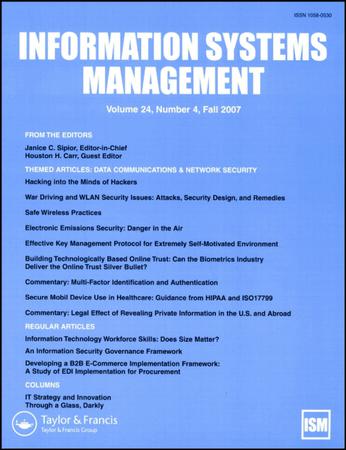From the Editor
IF 3.9
3区 管理学
Q2 COMPUTER SCIENCE, INFORMATION SYSTEMS
引用次数: 0
Abstract
I am pleased to introduce the third issue of Volume 40. Five articles are included in this issue. A conceptual framework for artificial intelligence (AI) governance is proposed in the first article, entitled “Artificial Intelligence Governance For Businesses,” by Johannes Schneider, Rene Abraham, Christian Meske, and Jan vom Brocke. Based upon AI and machine learning literature, this framework classifies governance according to the governance of data, machine learning models, and AI systems along the dimensions of who is governed, what is governed, and how it is governed. The second article, entitled “Investigating the Mediating Effect of Business-IT Alignment between Management of IT Investment and Firm Performance,” by Ilmudeen Aboobucker, Yukun Bao, and Peilin Zhang, investigates how business-IT alignment mediates the management of IT investment and firm performance. The results reveal that business-IT alignment has a partial mediating role in the management of IT investment and firm performance. In the third article, authors Jennifer Jewer, Búi K. Peterson, Raymond G. Gosine, and Peter J. Warrian explore the impact of the institutional environment on the decision to outsource digital innovation in the article entitled “Boundaries and Boundary Spanning in Digital Innovation Outsourcing: The Influence of Institutional Logics and Governance Systems.” The findings show that different types of governance systems can enable or constrain boundary spanning mechanisms that influence the ability of organizations to address their divergent logics and influence the propensity to outsource digital innovation. In the fourth article, entitled “System and Information Qualities in Mobile Fitness Apps and their Effects on User Behavior and Performance,” authors Mobark Q. Aldossari, Quynh N. Nguyen, Anh Ta, and Steven A. Schulz propose and test a model that examines factors that influence the use of goal setting and goal tracking in mobile fitness apps and the impact on user behavior change. The results confirm the importance of system quality and information quality on goal tracking and goal setting use of mobile fitness apps. Finally, the last article in this issue, “Work-to-Home Cybersecurity Spillover: Construct Development and Validation,” authored by Lakshmi Goel, Justin Zuopeng Zhang, and Steven Williamson, investigates workers’ cybersecurity behavior transferred from their workspace to their homes through teleworking and using cloud-based services to remotely access and process their work-related files. Cybersecurity behavior is empirically formalized and confirmed as a new construct referred to as Practice-based Work-toHome Cybersecurity Spillover. Submission details are presented on the ISM website: http://www.tandfonline.com/uism Submissions are welcome through ScholarOne’s Manuscript Central for ISM at: http://mc.manuscriptcentral.com/uism Please consider the Information Systems Management journal for publication of your best research. Also, I invite you to consider guest editing a special issue. Finally, I would like to thank our devoted readership, the Senior Editors for their expertise in overseeing submissions, the authors for undertaking quality research, and the many reviewers for conscientiously providing valuable feedback to authors. Happy reading!来自编辑器
我很高兴向大家介绍第40卷的第三期。本期共收录五篇文章。Johannes Schneider、Rene Abraham、Christian Meske和Jan vom Brocke在题为“企业的人工智能治理”的第一篇文章中提出了人工智能治理的概念框架。基于人工智能和机器学习文献,该框架根据数据治理、机器学习模型和人工智能系统,按照谁被治理、什么被治理以及如何治理的维度对治理进行分类。Ilmudeen Aboobucker、Yukun Bao和Peilin Zhang的第二篇文章题为“调查企业IT联盟在IT投资管理和企业绩效之间的中介作用”,研究了企业IT联盟如何中介IT投资管理与企业绩效。研究结果表明,企业IT联盟在IT投资管理和企业绩效管理中具有部分中介作用。在第三篇文章中,作者Jennifer Jewer、Búi K.Peterson、Raymond G.Gosine和Peter J.Warrian在题为“数字创新外包中的边界和边界跨越:制度逻辑和治理系统的影响”的文章中探讨了制度环境对数字创新外包决策的影响。“研究结果表明,不同类型的治理系统可以启用或约束边界跨越机制,这些机制影响组织解决其不同逻辑的能力,并影响外包数字创新的倾向。在题为“移动健身应用程序中的系统和信息质量及其对用户行为和性能的影响”的第四篇文章中,作者Mobark Q.Aldossari、Quynh N.Nguyen、Anh Ta和Steven A.Schulz提出并测试了一个模型,该模型考察了影响移动健身应用中使用目标设定和目标跟踪的因素,以及对用户行为变化的影响。研究结果证实了系统质量和信息质量对移动健身应用程序目标跟踪和目标设定的重要性。最后,本期最后一篇由Lakshmi Goel、Justin Zuopeng Zhang和Steven Williamson撰写的文章《工作到家庭的网络安全溢出:构建开发和验证》调查了员工通过远程工作和使用基于云的服务远程访问和处理工作文件从工作场所转移到家中的网络安全行为。网络安全行为是经验形式化的,并被确认为一种新的结构,称为基于实践的工作到家庭网络安全溢出。ISM网站上提供了提交的详细信息:http://www.tandfonline.com/uism欢迎通过ScholarOne的ISM手稿中心提交意见,网址:http://mc.manuscriptcentral.com/uism请参阅《信息系统管理》杂志,以发表您的最佳研究成果。此外,我邀请您考虑客座编辑一期特刊。最后,我要感谢我们忠实的读者群,感谢资深编辑在监督投稿方面的专业知识,感谢作者进行高质量的研究,感谢许多审稿人认真为作者提供宝贵的反馈。阅读愉快!
本文章由计算机程序翻译,如有差异,请以英文原文为准。
求助全文
约1分钟内获得全文
求助全文
来源期刊

Information Systems Management
工程技术-计算机:信息系统
CiteScore
14.60
自引率
1.60%
发文量
20
审稿时长
>12 weeks
期刊介绍:
Information Systems Management (ISM) is the on-going exchange of academic research, best practices, and insights based on managerial experience. The journal’s goal is to advance the practice of information systems management through this exchange.
To meet this goal, ISM features themed papers examining a particular topic. In addition to themed papers, the journal regularly publishes on the following topics in IS management.
Achieving Strategic IT Alignment and Capabilities
IT Governance
CIO and IT Leadership Roles
IT Sourcing
Planning and Managing an Enterprise Infrastructure
IT Security
Selecting and Delivering Application Solutions
Portfolio Management
Managing Complex IT Projects
E-Business Technologies
Supporting Knowledge Work
The target readership includes both academics and practitioners. Hence, submissions integrating research and practice, and providing implications for both, are encouraged.
 求助内容:
求助内容: 应助结果提醒方式:
应助结果提醒方式:


